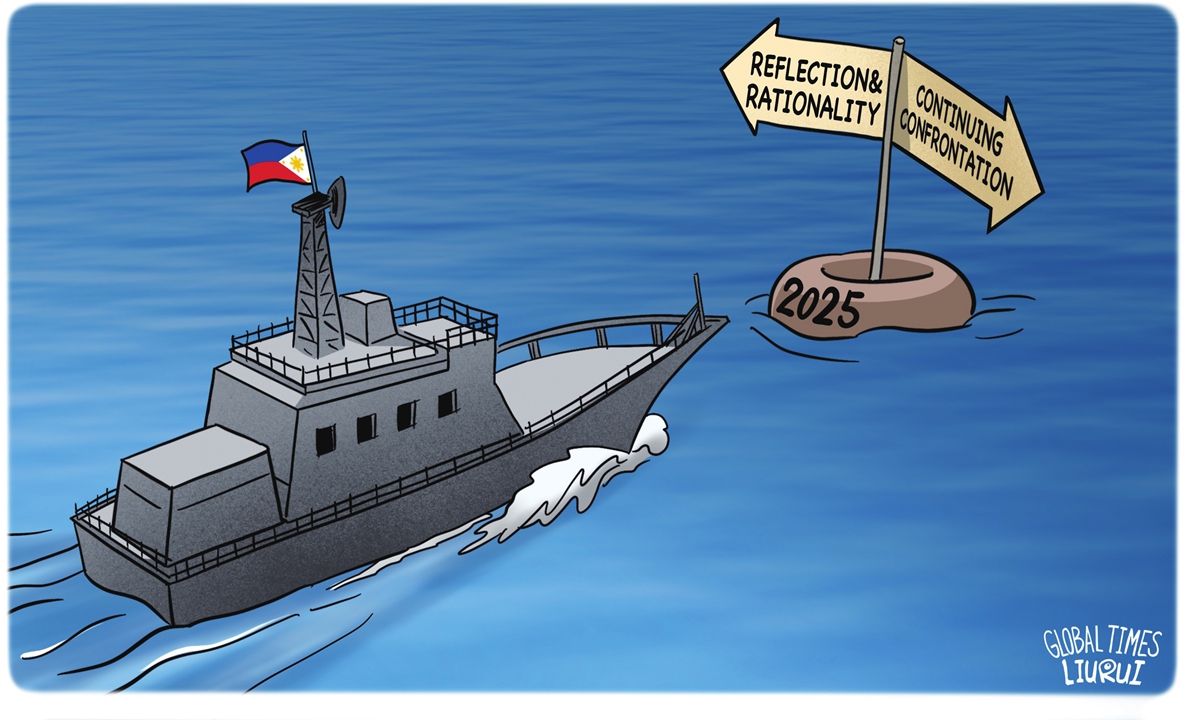
Illustration: Liu Rui/GT
The Financial Times reported on Tuesday that two years of escalating "confrontation" in the South China Sea have persuaded the Philippines that "going head-on against Beijing is not viable." "We cannot go toe to toe with China," said Jonathan Malaya, assistant director-general in President Ferdinand Marcos Jr's National Security Council. "We are not a rising superpower like China who has enormous resources at their disposal, so we have to live with what we have."
Do these remarks signal that the Philippines is preparing to adopt a more rational and pragmatic approach on the South China Sea affair? Obviously not. It is merely a trick of playing the victim.
Over the past year, it was the Philippines' repeated provocations and the discrepancy between its words and actions that kept the South China Sea situation remained troubled. The Philippines deliberately sailed toward Chinese ships multiple times, and through selective editing and extensive coverage by Western media, it sought to create the false impression that China was "bullying" it. In November, the Philippines even signed the Philippine Maritime Zones Act and Philippine Archipelagic Sea Lanes Act, which have been protested by relevant countries, including China and Malaysia.
Additionally, the Philippines went back on its promises by refusing to withdraw the US Typhon missile system deployed within its borders. It even announced plans to procure and permanently deploy such strategic and offensive weapons, further bringing the risk of geopolitical confrontation and an arms race to the region.
The biggest loss for the Philippines, which has repeatedly adopted a confrontational stance on the South China Sea issue, is the deterioration of its relationship with China. "The Philippines' provocative actions in the South China Sea have not gained any substantial benefits, but instead have worsened its economic situation, ultimately leaving the country in an undesirable position," Song Zhongping, a Chinese military expert, told the Global Times.
Moreover, the Philippines' increased military cooperation with external powers has not made the country safer but has turned its territory into a potential battleground. In the meantime, the Philippines has lost its international credibility and is gradually losing support from regional countries. Its clumsy performance in the South China Sea will ultimately become a poorly received one-man show.
The actions of the Marcos Jr. administration are a classic case of "shooting oneself in the foot."
Song believes that in 2025, the Philippines will likely repeat its past tactics on the South China Sea issue. However, with the change of the US' administration, Manila may find itself in a situation where it lacks the support it once had. "The key factor behind the intensifying provocations of the Marcos Jr. administration on the South China Sea issue was the strong backing from the Biden administration. The incoming Trump administration, however, may reconsider the benefits that supporting the Philippines could bring to the US," Song told the Global Times.
China has always advocated resolving disputes through peaceful means, including negotiations and consultations. In 2025, we hope the Philippines will engage less in playing the victim, stop inciting and sensationalizing conflicts, and move toward a more cooperative approach with China regarding the South China Sea issue.
If the Philippines continues to exaggerate the "Big China vs small Philippines" narrative to gain sympathy, such tactics will not succeed. Instead, it will only push the Philippines further away from ASEAN and the international community.



